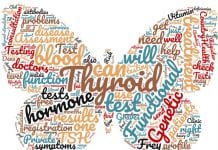A diagnosis of prostate cancer leaves one feeling not only that one’s whole world has collapsed but also as if one’s whole persona has been blasted out of the water. For any male, to have ‘issues’ in this most up-close-and-personal arena is life-altering, to say the least. The biggest blow is not just coping with the physical symptoms and treatment to come, it’s the emotional impact that threatens one’s masculinity and manhood. Feeling afraid of all the unknowns and ramifications in the world of prostate cancer is a perfectly normal response. The best weapon of defence is offence, so learning about one’s new reality shrinks the fear and the helplessness, putting one in line to work with a healthcare team.
Hot tip: If you have a spouse, understand that your partner will be feeling pretty much the same as you do. Get yourself out of victim mode and into gear as the two of you go forward, tackling unchartered waters together as a team. If the diagnosis is advanced prostate cancer, the two of you will both be addressing coming to terms with mortality. Removing that fear is key to coping.
Signs And Symptoms Of Prostate Cancer
A medical examination is imperative in the case of the male prostate because some men, despite the presence of cancer, appear quite symptom-free! For most though, a series of awkward signs and symptoms will have been experienced. Here is a basic list of the most common indicators:
- Difficulty or inability to urinate standing up
- Frequent urge to urinate – including at night
- Stop/start urination or poor stream
- Burning during urination or ejaculation
- Blood in the urine
- Blood in the semen
- Pain in the bones of the back and pelvis
- Bone fractures in the pelvic area
- Obstruction of the urethra
- Enlarged lymph glands of the pelvis
- Enlarged prostate
- Swelling of the legs
- Erectile dysfunction – where difficulty was not experienced before
Alternative Health Care For Prostate Cancer
The biggest challenge for most folk is to maintain control over their own treatment. Professionals in all fields are just that – professionals, they cannot take your journey for you. But they have knowledge, skill and experience that you can tap into to chart the course you feel is right for you.
Standard treatments have unwanted side effects and that alone drives sufferers to seek out alternatives. The great news is that alternative health care for prostate cancer, even in advanced stage has a proven track record. Don’t imagine it’s a good idea to ‘cover all the bases’ by accepting traditional medications, radiation and surgeries and adding some herbal remedies promising a one-pill cure. We want to avoid drug-herb interactions. Whatever you decide, be sure to be transparent with whoever your healthcare provider is. If your oncologist does not want to accept any other option of treatment besides the conventional then it is up to you to do your research thoroughly to determine alternative treatments available.
It is advisable to consult an Integrative Physician (Medical Doctor with training in Alternative cancer and other medical disorders treatments) with experience in treating cancer in combination with a urologist surgeon or oncologist.
One thing is sure: a body already compromised with prostate cancer needs nutrition as close to what is natural as possible. The body struggles to recognize laboratory manufactured, imitation medications or minerals or vitamins at the best of times. Our body cells are designed to ‘recognise’ the structure of things that are natural which allows for optimal absorption.
How To Gain Control Despite A Prostate Cancer Diagnosis
It is innate in the masculine gender to want to feel in charge. Cancer in the prostate gland can make one feel somewhat violated by something totally out of one’s control. The basic principle that covers all of life, works in this case also. Break whatever we face into two components:
1) What we CANNOT control
2) What we CAN control
What CAN’T we control? In this case, we can’t control a prostate cancer diagnosis. That is our new reality. The sooner we apply a spirit of acceptance of that, the sooner we create the mental and emotional expansiveness we need to get on with what we CAN control. Don’t waste time whimpering ‘why me?’ or doubting our worth or wrapping ourselves up in a martyr’s blanket only to sit all day on a ‘pity pot’ – definitely not good for anyone’s prostate! We can take charge by educating ourselves knowing just how many options we have and how many have walked the same road before us. We can get the support we need despite prostate cancer’s presence in our lives and face the future with courage. Letting go of outcomes buys us the freedom to sense innately what is working for us and what isn’t. Tuning in to our bodies and learning it’s responses provides incomparable feedback for our healthcare team.
Examination and Testing
The diagnosis of prostate cancer is made on a digital rectal examination (DRE) by a doctor or urologist. In addition, an ultrasound scan or CT or MRI scan can be done together with a blood PSA test, plus a general examination and blood tests. If the examination and test results are positive, then a prostate biopsy(ies) and possibly lymph nodes as well, will be done.
Integrative Medicine Treatment Options
From an integrative medicine point of view, the following treatment options are recommended depending on the stage of the prostate cancer. Stage 1 is when the cancer is localised to the prostate gland only and has not broken through the capsule. Stage 2 is when the cancer has broken through the capsule and may have spread to the adjacent lymph nodes. Stage 3 and 4 is when the cancer has spread to other organs or structures and glands in the body.
Stage 1:
- Surgical removal
- Surgical removal using the DaVinci Robot
- Surgical removal as above with Viro ImmunoTherapy
- Surgical removal with anti-cancer natural therapies
- Surgical removal with Viro ImmunoTherapy and anti-cancer natural therapies.
- Surgical removal plus Chemotherapy (Conventional treatment only)
- Brachytherapy only (Conventional treatment only)
Stage 2:
- As above with surgical removal of lymph nodes
- Radioactive pellets insertion (Brachytherapy) into prostate (Conventional treatment only)
- Chemotherapy only (Conventional treatment only)
Stage 3 & 4:
- Viro ImmunoTherapy only
- Viro ImmunoTherapy and anti-cancer natural therapies
- Anti-cancer natural therapies only
- Chemotherapy only (Conventional treatment only)
- Chemotherapy and targeted radiation therapy only (Conventional treatment only)
The above are some of the possible treatment options from an Integrative Medicine point of view. If an individual does not want surgery or chemotherapy and/or radiation therapy or cannot have any of these therapies for medical reasons, then the options for treatment are Viro ImmunoTherapy and/or other anti-cancer natural therapies.















